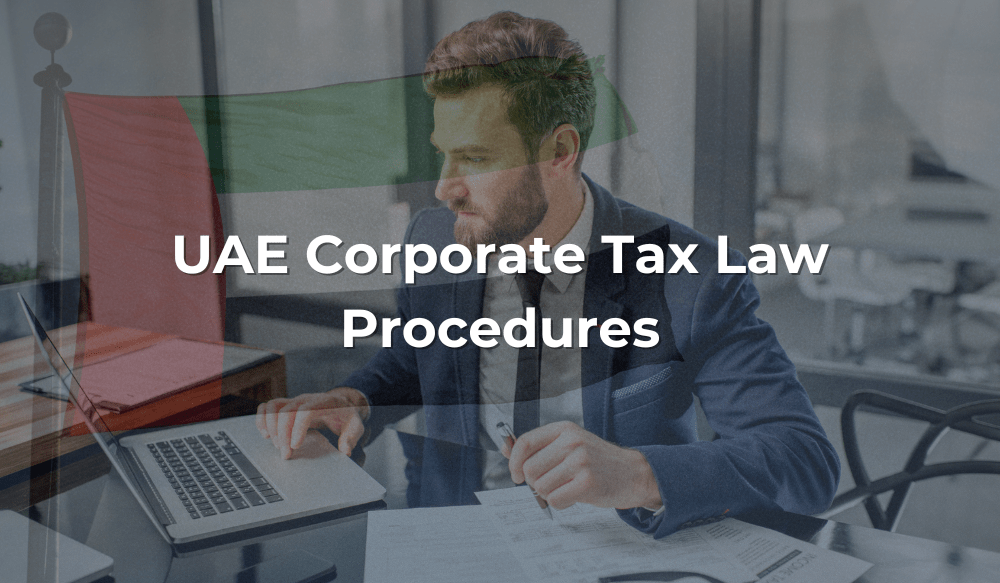
Introduction
The UAE Ministry of Finance made a breakthrough announcement in January 2022 that it will introduce federal Corporate Tax in UAE post which it introduced the Federal Decree Law No. 47 of 2022 on the Taxation of Corporations and Businesses by virtue of which Corporate Tax has been introduced in UAE making a landmark change the taxation system of UAE.
The Corporate Tax Law is applicable to businesses and taxable persons as defined under the law with effect from financial years starting on or after 1 June 2023. The UAE Corporate Tax regime has been designed to incorporate best practices globally and minimise the compliance burden on businesses. Therefore, ample time has been given to the taxpayers for gearing up for the smooth implementation of the historic Corporate Tax law in UAE and to enable the businesses to be ready for complying with the procedures prescribed under the law.
Accordingly, in order to prepare for the implementation and adoption of the Corporate Tax Law, businesses need to follow certain procedures as has been prescribed under the Corporate Tax Law and vide subsequent Cabinet decision No. 74 of 2020. We have discussed and summarized these Corporate Income Tax Law procedures which needs to be followed for easy and smooth implementation of the Corporate Law to the taxable persons governed by the law.
Corporate Tax Law Procedures
- Record Keeping
- Tax Registration & Deregistration
- Tax Returns & Tax Payable
- Voluntary Disclosure
- Tax Audit
1. Record Keeping
Businesses will have to keep accounting records and commercial books (eg. Financial Statements, records of inventories and fixed assets, documents relating to Related Party Transactions, Invoices, Contracts etc.) for each Financial Year followed by the person and the Federal Tax Authority (‘FTA’) may request any information for verification and/or audit. Therefore, the preparation of Financial Statements and adequate documentation will be of vital importance in the journey of implementing Corporate Tax, as the same will be the base of calculating Corporate Tax liability, allowances and disallowances of expenditures, identification of Related Party Transactions, tax assessments, etc.
As per the provisions of Corporate Tax Law, all the records shall be maintained for a period of 7 years from the end of the calendar year in which such record was created. Similar to the taxable persons, exempt persons shall also maintain the records for 7 years to enable the FTA to examine and ascertain the status of the Exempt person. The records can be maintained in English or in Arabic. (It is further prescribed that the records may be maintained for an additional period of 4 years in case of dispute between the taxable person and the FTA, or in case of an ongoing Tax Audit. Further, in case of submission of a Voluntary disclosure, documents to be maintained for an additional period of 1 year).
Note:- VAT regulations provide for real estate records to be maintained for a period of 15 years whereas as per the provisions mentioned above, records are to be maintained for a period of 7 years. It should also be noted that the Corporate Tax Law prescribes all taxpayers to maintain the records for 7 years whereas the subsequent Cabinet Decision issued on Tax Procedures prescribes to maintain records for 5 years, except real estate records which are to be kept for 7 years. Therefore, it is highly anticipated that there may be some clarification issued to clarify these aspects.
2. Tax Registration and Deregistration
Tax Registration:-
Every taxable person shall register for Corporate Tax with the FTA in the form and manner and within the timeline prescribed by the FTA and obtain a Tax Registration Number (‘TRN’). Though there has been no due date prescribed by the FTA yet by which registration is to be done, however, FTA is encouraging all taxpayers to register at the earliest. Further, the timelines for opening of registration on the Emara portal are as under:-
| Category of Person | Opening of Registration |
| Public Joint Stock Companies Private Companies | 15 May 2023 |
| Natural Persons Partnerships | August 2023 |
| Qualified Public Benefits Entities | October 2023 |
| Qualifying Investment Fund Public or Private Pension or Social Security Fund Juridical person incorporated and wholly owned and controlled by Exempt Persons | June 2024 |
Further, it is mandatory to notify the FTA within 20 business days about any change in email address, trade license activities, legal entity type, partnership agreement, nature of business and address from which business is conducted.
Tax Deregistration:-
A person shall file an application for Tax Deregistration in case of cessation of business or business activity, whether by dissolution, liquidation or otherwise, in the form and manner as prescribed by FTA. The timeline to file application for deregistration has been prescribed as 3 months within the period of cessation of business, dissolution, liquidation, etc. The FTA may, at its discretion, deregister a registrant where the person is required to deregister for a specific tax type but fails to submit a deregistration application.
3. Tax Returns & Tax Payable registration
A taxable person must file a Tax Return, in the form and manner as may be prescribed by the FTA, no later than 9 months from the end of the relevant Tax Period, or such other date as may be directed by the FTA. Further, the date of corporate tax payment is also aligned to the due date of filing of Tax Returns i.e. 9 months from the end of the relevant Tax Period.
E.g. In case the person follows the calendar year as the Tax Period, then the first Return under the Corporate Tax will be due in September 2025 (i.e. 9 months from the end of the year 2024).
In cases where the person is exempt from Corporate Tax, FTA may request such persons to submit a declaration, rather than a full-scale Tax Return, in order to enable the FTA to obtain information to verify if such persons continue to fulfil the conditions allowing them to be exempt from CT.
4. Voluntary Disclosure
It has been prescribed that the taxpayers shall submit a Voluntary Disclosure to the FTA within a period of 20 business days from the date when the Taxable Person became aware of the error. Further, Voluntary Disclosure is required to be submitted even if there is no difference in amount of tax payable (e.g. in case of any incorrect reporting in the Return).
5. Tax Audits
It has been provided that the FTA shall have the power to conduct a Tax Audit of any person at its sole discretion and FTA’s decision shall not be objected to or challenged by any person.
The FTA shall provide at least 10 business days notice period to the Taxpayer before conducting a Tax Audit.
During the course of Tax Audit, FTA may inspect the taxpayer’s premises, documents and assets available at the premises, data and records stored digitally and the accounting systems used by the taxpayer. Further, the Tax Auditor may make copies of the documents, seize the documents and assets, mark the original documents and assets for the purpose of indicating that they have been inspected, etc. In case any documents are seized, FTA shall provide a record of what was seized within a period of 10 business days from the date of seizure. FTA also has the rights and powers to sell the seized goods/assets by following the detailed measures and procedures prescribed.
The person subject to Tax Audit shall be notified of the results of Tax Audit within 10 business days from the end of the Tax Audit.
Concluding Remarks
It is clear that though the first Corporate Tax Return for the majority of the taxpayers will be due in September 2025, however, the taxpayers need to take several steps (starting from Corporate Tax Impact assessment, business restructuring, preparation of financial statements, documentation including Transfer Pricing documentation and compliances, etc.) prior to filing of Corporate Tax Return in order to comply with the Corporate Tax Law efficiently and for its smooth implementation in their business.
It is evident that the Corporate Tax Law in the UAE will be implemented in line with international best practices, robust documentation, transparency, global accounting standards and principles of international taxation followed globally, in order to ensure the sustainability of the economy of UAE, being a global business hub and a strategic location for foreign investors. Global MNEs will also be soon governed by the Minimum Tax Rates prescribed by OECD BEPS Pillar 2, once the same is adopted by the UAE, which may likely happen soon. With rapid developments and implementation of Corporate Tax Law in UAE, it will be an exciting time ahead for the UAE taxation regime with drastic changes being implemented in the country.
Therefore, it will be vitally important for businesses to seek right Corporate Tax Advisory and seek help and guidance from eminent Corporate Tax Consultant and Consultants in UAE to prepare the businesses in adoption and implementation of the Corporate Tax Law effectively in a time bound and compliant manner.
Read Also: UAE Corporate Tax Strategies



